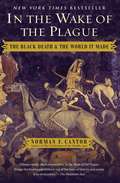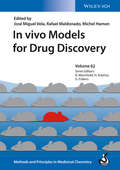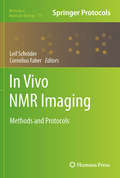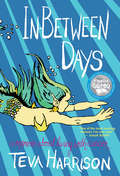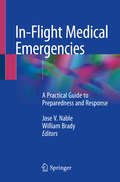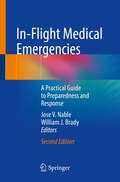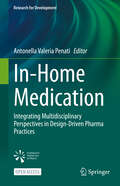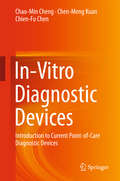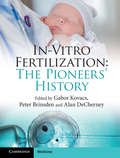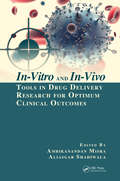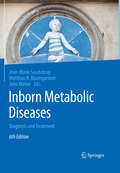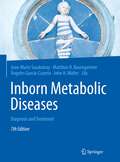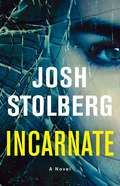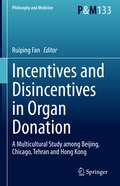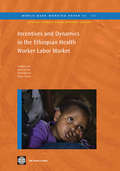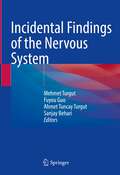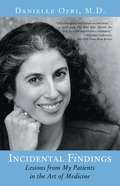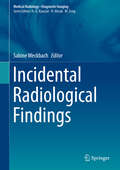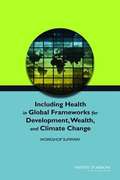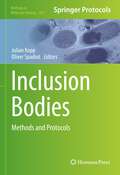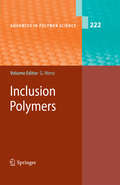- Table View
- List View
In the Twilight, In the Evening (Cheney Duvall, M. D. Ser. #6)
by Lynn MorrisFROM NEW ORLEANS TO SAN FRANCISCO, Cheney and Shiloh are now working at a large hospital--a contrast from their previous circumstances. Though Cheney is accepted and respected by most of the other doctors, the medical personnel under her supervision question her character, her intent, and her skills. Further, she and Shiloh must constantly be on alert to ensure that fair and conscientious medical treatment is provided to the city's down-and-outers. When a catastrophe strikes, they find themselves stretched far beyond their knowledge and experience. Cheney has to trust God for the help and direction she needs and remind herself that "...the ways of man are before the eyes of the Lord..." Catastrophe strikes without warning, and Cheny's medical training and experience have not prepared her for the struggle...
In the Wake of the Plague: The Black Death and the World It Made
by Norman F. CantorMuch of what we know about the greatest medical disaster ever, the Black Plague of the fourteenth century, is wrong. The details of the Plague etched in the minds of terrified schoolchildren -- the hideous black welts, the high fever, and the final, awful end by respiratory failure -- are more or less accurate. But what the Plague really was, and how it made history, remain shrouded in a haze of myths.Norman Cantor, the premier historian of the Middle Ages, draws together the most recent scientific discoveries and groundbreaking historical research to pierce the mist and tell the story of the Black Death afresh, as a gripping, intimate narrative.In the Wake of the Plague presents a microcosmic view of the Plague in England (and on the continent), telling the stories of the men and women of the fourteenth century, from peasant to priest, and from merchant to king. Cantor introduces a fascinating cast of characters. We meet, among others, fifteen-year-old Princess Joan of England, on her way to Spain to marry a Castilian prince; Thomas of Birmingham, abbot of Halesowen, responsible for his abbey as a CEO is for his business in a desperate time; and the once-prominent landowner John le Strange, who sees the Black Death tear away his family's lands and then its very name as it washes, unchecked, over Europe in wave after wave.Cantor argues that despite the devastation that made the Plague so terrifying, the disease that killed more than 40 percent of Europe's population had some beneficial results. The often literal demise of the old order meant that new, more scientific thinking increasingly prevailed where church dogma had once reigned supreme. In effect, the Black Death heralded an intellectual revolution. There was also an explosion of art: tapestries became popular as window protection against the supposedly airborne virus, and a great number of painters responded to the Plague. Finally, the Black Death marked an economic sea change: the onset of what Cantor refers to as turbocapitalism; the peasants who survived the Plague thrived, creating Europe's first class of independent farmers.Here are those stories and others, in a tale of triumph coming out of the darkest horror, wrapped up in a scientific mystery that persists, in part, to this day. Cantor's portrait of the Black Death's world is pro-vocative and captivating. Not since Barbara Tuchman's A Distant Mirror have medieval men and women been brought so vividly to life. The greatest popularizer of the Middle Ages has written the period's most fascinating narrative.
In vivo Models for Drug Discovery, Volume 62
by Raimund Mannhold Gerd Folkers Hugo Kubinyi Michel Hamon José M Vela Rafael MaldonadoThis one-stop reference is the first to present the complete picture -- covering all relevant organisms, from single cells to mammals, as well as all major disease areas, including neurological disorders, cancer and infectious diseases. Addressing the needs of the pharmaceutical industry, this unique handbook adopts a broad perspective on the use of animals in the early part of the drug development process, including regulatory rules and limitations, as well as numerous examples from real-life drug development projects. After a general introduction to the topic, the expert contributors from research-driven pharmaceutical companies discuss the basic considerations of using animal models, including ethical issues. The main part of the book systematically surveys the most important disease areas for current drug development, from cardiovascular to endocrine disorders, and from infectious to neurological diseases. For each area, the availability of animal models for target validation, hit finding and lead profiling is reviewed, backed by numerous examples of both successes and failures among the use of animal models. The whole is rounded off with a discussion of perspectives and challenges. Key knowledge for drug researchers in industry as well as academia.
In vivo NMR Imaging
by Leif Schröder Cornelius FaberNuclear magnetic resonance imaging represents a technique that is indispensable in every day biomedical diagnostics. Thanks to the numerous ways to manipulate and detect an NMR signal, it is possible to obtain a variety of information with excellent spatial and temporal resolution. Today's MRI techniques go far beyond the illustration of pure anatomical structures and include the revealing of processes down to the molecular level. The number of small animal imaging centers relying on MRI as a key method for preclinical research to understand diseases and to test for novel treatments is growing rapidly. In Vivo NMR Imaging: Methods and Protocols is written as an experimental laboratory text to provide a descriptive approach of the various applications of magnetic resonance imaging and its underlying principles. Starting from a compact introduction of basic NMR physics and image encoding techniques suitable for a broad audience in the life sciences, the concept focuses on addressing the many ways of generating contrast in MR images. The authors cover an interdisciplinary range of problems to be addressed by this non-invasive modality, including study protocols for addressing morphological, physiological, functional, and biochemical aspects of various tissues in living organisms. Information about practical aspects of designing experimental studies that follow the special conditions for micro imaging setups are also provided. Written in the successful Methods in Molecular BiologyTM series format, In Vivo NMR Imaging: Methods and Protocols aims to be an experimental compendium of modern in vivo MR imaging with special focus on recent developments in molecular imaging and new protocols for imaging metabolism and molecular markers.
In-Between Days: A Memoir About Living with Cancer
by Teva Harrison2016 Governor General's Literary Award Finalist2017 Kobo Emerging Writer Prize Winner2017 Joe Shuster Award NomineeTeva Harrison was diagnosed with metastatic breast cancer at the age of 37. In this brilliant and inspiring graphic memoir, she documents through comic illustration and short personal essays what it means to live with the disease. She confronts with heartbreaking honesty the crises of identity that cancer brings: a lifelong vegetarian, Teva agrees to use experimental drugs that have been tested on animals. She struggles to reconcile her long-term goals with an uncertain future, balancing the innate sadness of cancer with everyday acts of hope and wonder. She also examines those quiet moments of helplessness and loving with her husband, her family, and her friends, while they all adjust to the new normal.Ultimately, In-Between Days is redemptive and uplifting, reminding each one of us of how beautiful life is, and what a gift.
In-Flight Medical Emergencies: A Practical Guide To Preparedness And Response
by William Brady Jose V. NableThis book is a practical guide for health care professionals encountering medical emergencies during commercial flight. Health care providers should consider responding to emergencies during flight as there are often no other qualified individuals on board. This text covers the most common emergencies encountered during flight, both general medical emergencies and those specifically tied to the effects of flying, including cardiac, respiratory, and neurological issues. Medicolegal issues are considered in depth, for both United States domestic and international flights, as there is potential legal risk involved in giving medical assistance on a flight. Additional chapters are dedicated to pre-flight clearance and the role non-physician healthcare providers can play. In-Flight Medical Emergencies: A Practical Guide to Preparedness and Response is an essential resource for not only physicians but all healthcare professionals who travel regularly.
In-Flight Medical Emergencies: A Practical Guide to Preparedness and Response
by William J. Brady Jose V. NableThis book functions as a practical guide for health care professionals encountering medical emergencies during a commercial flight. A second edition to its successful predecessor, this text covers the most common emergencies encountered during flight, both general medical emergencies and those specifically tied to the effects of flying, including cardiac, respiratory, and neurological issues. Medicolegal issues are considered in depth for both United States domestic and international flights, as there is potential legal risk involved in giving medical assistance on a flight. This new edition includes expanded and updated original chapters revised based on available new research material. Additional chapters examine how to handle disruptive passengers experiencing acute behavioral issues during flight, emerging infectious diseases. This issue is particularly relevant due to COVID-19, specifically concerning the anxiety and readjustment challenges of resuming everyday travel. This edition includes a new chapter recounting the history of the handling of in-flight medical events. In-Flight Medical Emergencies, 2nd ed functions as an essential resource for physicians and all healthcare professionals who travel regularly.
In-Home Medication: Integrating Multidisciplinary Perspectives in Design-Driven Pharma Practices (Research for Development)
by Antonella Valeria PenatiThis is an open access book. This book provides a distinctive perspective on the daily utilization and consumption of medicines and drugs. It seamlessly integrates the research traditions of the medical and pharmaceutical realms with the approach of fostering the relationship between users and products, a characteristic of design and user studies. By applying a diverse range of expertise, the authors endeavor to reestablish the interconnectedness of issues that place the drug and the indispensable information for its use directly into the hands of the patient. The primary objective is to formulate an initial set of recommendations and compile a repertoire of best practices. Consequently, this book becomes an indispensable resource for students, professionals, and academics engaged in design culture, as well as those operating within the healthcare domain, such as the pharmaceutical industry, medical practitioners, and pharmacists. It is equally valuable for individuals working in institutions responsible for regulating medicines and overseeing their presence in the market. As a comprehensive guide, this book serves as an essential read, offering insights that bridge the gap between various sectors involved in the intricate landscape of medicine and drug consumption.
In-Vitro Diagnostic Devices
by Chao-Min Cheng Chen-Meng Kuan Chien-Fu ChenAddressing the origin, current status, and future development of point-of-care diagnostics, and serving to integrate knowledge and tools from Analytical Chemistry, Bioengineering, Biomaterials, and Nanotechnology, this book focusses on addressing the collective and combined needs of industry and academia (including medical schools) to effectively conduct interdisciplinary research. In addition to summarizing and detailing developed diagnostic devices, this book will attempt to point out the possible future trends of development for point-of-care diagnostics using both scientifically based research and practical engineering needs with the aim to help novices comprehensively understand the development of point-of-care diagnostics. This includes demonstrating several common but critical principles and mechanisms used in point-of-care diagnostics that address practical needs (e. g. , disease or healthcare monitoring) using two well-developed examples so far: 1) blood glucose meters (via electrochemistry); and, 2) pregnancy tests (via lateral flow assay). Readers of this book will come to fully comprehend how to develop point-of-care diagnostics devices, and will be inspired to contribute to a critical global cause - the development of inexpensive, effective, and portable in vitro diagnostics tools (for any purpose) that can be used either at home or in resource limited areas.
In-Vitro Fertilization
by Kay Elder Brian Dale Yves Ménézo Joyce Harper John HuntrissThis fully updated new edition of a successful and popular practical guide is an indispensable account of modern in-vitro fertilization practice. Initial chapters cover theoretical aspects of gametogenesis and embryo development at the cellular and molecular level, while the latter half of the book describes the requisites for a successful IVF laboratory and the basic technologies in ART. Advanced techniques, including pre-implantation genetic diagnosis, vitrification and stem-cell technology, are comprehensively covered, providing up-to-date analyses of these groundbreaking technologies. This edition includes: - New practical techniques, including preservation of fertility for cancer patients, stem-cell biology/technology, vitrification and in-vitro maturation - A 'refresher' study review of fundamental principles of cell and molecular biology - The latest information available from animal and human research in reproductive biology Packed with a wealth of practical and scientific detail, this is a must for all IVF practitioners.
In-Vitro Fertilization
by Kay Elder Brian DaleThis extensively updated new edition provides an indispensable account of modern in-vitro fertilization practice, building upon the popularity of previous editions. The authors initially give a comprehensive review of the biology of human gametes and embryos, before outlining basic to advanced IVF techniques. New developments in practical techniques and understanding are discussed, including in-vitro maturation, vitrification, preservation of fertility for cancer patients, stem cell technology, preimplantation genetic testing, and the role of epigenetics and imprinting. The revised introduction also incorporates a 'refresher' study review of fundamental principles of cell and molecular biology, now updated with current knowledge of meiosis in human oocytes, embryo metabolism and basic principles of genome editing. With high-quality illustrations and extensive, up-to-date reading lists, it is a must-have textbook for trainee and practising embryologists, as well as clinicians who are interested in the scientific principles that underpin successful IVF.
In-Vitro Fertilization: The Pioneers' History
by Gabor Kovacs Peter Brinsden Alan DeCherneyThe birth of Louise Joy Brown - the world's first baby born following in-vitro fertilization - heralded a medical revolution. Forty years later, many thousands of babies are born each year following IVF. Assisted reproduction is a global industry with a multi-billion dollar turnover. It is a complex mix of science, clinical management, bioethics, and commercial imperatives. Many of the pioneers of IVF are still with us and have a fascinating tale to tell. Here, they relate the story of the development of IVF and related technologies in a way that will prove invaluable to future generations of practitioners seeking to understand the genesis of the specialty. This is not an academic history: rather it takes an informal and anecdotal approach; informing and entertaining for generations of past, present and future medical and scientific specialists of IVF, alongside the millions of parents, who celebrated the successes of IVF treatment worldwide.
In-Vitro and In-Vivo Tools in Drug Delivery Research for Optimum Clinical Outcomes
by Ambikanandan Misra Aliasgar ShahiwalaThis book covers the essentials of drug delivery research and provides a unique forum for scientific experimental methods that are exclusively focused by the in-vitro, ex-vivo, and in-vivo methodologies of drug delivery research and felicitates translational research. The book includes recent and novel approaches in evaluation methods of transdermal, nasal, ocular, oral and intraoral, gastro-retentive, colon-targeted, and brain-targeted drug delivery systems. Providing up to date and comprehensive information, this text is invaluable to students, teachers, scientists, and others employed in the field of drug delivery.
Inborn Metabolic Diseases
by John Walter Jean-Marie Saudubray Matthias R. BaumgartnerThis work is recognised as the standard textbook for professionals involved in the diagnosis and management of inborn errors of metabolism (IEM) and an essential resource in this multidisciplinary field. For the 6th edition all 43 chapters have been newly written or revised by authors with particular expertise in their subject areas. Contents: A clinical and biochemical approach to the recognition and diagnosis of IEM with algorithms to symptoms, signs, and syndromes in patients of all ages; Emergency treatments; Medications - Separate comprehensive sections on IEM of: Carbohydrates; Mitochondrial Energy; Amino and organic acids; Vitamin-responsive defects; Neurotransmitter and Small peptides, Lipid and Bile Acids; Nucleic Acid and Heme; Organelles - Disorders affecting the synthesis and remodelling of complex lipids and fatty acid homeostasis are now included.
Inborn Metabolic Diseases: Diagnosis and Treatment
by Jean-Marie Saudubray Matthias R. Baumgartner John H. Walter Ángeles García-CazorlaThis 7th edition is a milestone in the series of Inborn Metabolic Diseases (IMD), recognised as the standard textbook for professionals involved in the diagnosis and management of IMD.Within the last 5 years a Copernican revolution in our understanding of IMD has changed the definition, concepts, paradigms, and classification. This new edition now extends the concept of IMD to include those disturbances in molecular machinery diagnosed by molecular techniques but currently without measurable metabolic markers.The book presents a clinical and biochemical approach to the diagnosis and management of IEM with many diagnostic algorithms for patients of all ages and with a particular focus on neurological presentations. It includes separate, comprehensive sections on IEM classified in 3 major pathophysiological categories: disorders of energy metabolism, both mitochondrial and non-mitochondrial; small molecule disorders, mostly diagnosed with metabolic markers; and complex molecules disorders, mostly diagnosed with molecular techniques.Two new chapters were added, describing around 600 disorders of nucleic acid metabolism, tRNA metabolism, ribosomal biogenesis, and cellular trafficking.
Incarnate: A Novel
by Josh StolbergAn ambitious and sharp-witted clinical psychiatrist turns detective when one of her patients comes under investigation for a series of brutal murders—is she a psychopath or a victim herself?Brilliant psychiatric resident Dr. Kim Patterson has one major flaw: she is too committed to her patients. Her willingness to break the rules and use unconventional methods to help her patients heal has already gotten her thrown out of several hospitals. And when Scarlett Hascall is brought into the psychiatric ward, Kim can’t resist getting involved, even if it means breaking protocol—because Kim can see what the other doctors cannot. Scarlett is suffering from a rare condition: Dissociative Identity Disorder, otherwise known as Multiple Personalities. But even Kim is at a loss when she realizes that some of Scarlett’s alternate identities are claiming to be people who have gone missing from their town. And when Scarlett’s alter identity “Izzi” knows way too much about the whereabouts of the missing Isabel Wilcox, the police begin to suspect that Scarlett may have been involved with Isabel’s disappearance. Only Kim defends Scarlett, certain of the girl’s innocence. But her new theory is a radical one, one she can hardly believe herself: What if Kim is channeling the troubled souls of these victims? With the help of local police officer Zack Trainor, Kim digs further into Isabel’s case, trying to find proof that Scarlett wasn’t involved. The more they discover, the more it becomes apparent that something strange and frightening is going on with Scarlett. Is it possible she is truly harboring lost souls? Or is Scarlett playing a twisted game with her doctors and the police?
Incentives and Disincentives in Organ Donation: A Multicultural Study among Beijing, Chicago, Tehran and Hong Kong (Philosophy and Medicine #133)
by Ruiping FanThis book provides the first systematic study on three types of incentives for organ donation. It covers extensive research conducted in four culturally different societies: Hong Kong, mainland China, Iran and the United States, and shows on the basis of the research that a new model of incentives can be constructed to enhance organ donation in contemporary societies. The book focuses on three types of incentives: honorary incentives, commonly adopted in the United States and other Western countries by offering things such as a thank-you card and a memorial park for donors to encourage donations motivated by pure altruism; compensationalist incentives, adopted in the Islamic Republic of Iran to encourage donation by providing monetary compensation to unrelated living donors for appreciating their altruistic contribution of donation; and familist incentives, implemented in Israel and mainland China to provide priority to organ transplantation to donors and/or their family members. The book demonstrates that a new model of incentives must go beyond offering only one type of incentives and should rather include different types of incentives that are practically effective, politically legitimate and ethically justifiable for particular societies. This implies that suitable incentive measures may vary from society to society to optimize organ donation. This book provides a clear reference for both the scholars and practitioners in the field of organ transplantation, as well as for general readers interested in bioethics and health care policy.
Incentives and Dynamics in the Ethiopian Health Worker Labor Market
by Agnes Soucat William Jack Joost De Laat Kara HansonBy international standards, health workers in Ethiopia are in short supply. In addition, those who do enter the health fields and remain in the country disproportionately live and work in the capital, Addis Ababa. This paper uses detailed data gathered from nearly 1,000 health workers to examine the incentives and constraints that health workers face when choosing where to work, the likely responses of workers to alternative incentive packages, and the longer term performance of the health worker labor market. This working paper was produced as part of the World Bank's Africa Region Health Systems for Outcomes (HSO) Program. The Program, funded by the World Bank, the Government of Norway, the Government of the United Kingdom and the Global Alliance for Vaccines and Immunization (GAVI), focuses on strengthening health systems in Africa to reach the poor and achieve tangible results related to Health, Nutrition and Population. The main pillars and focus of the program center on knowledge and capacity building related to Human Resources for Health, Health Financing, Pharmaceuticals, Governance and Service Delivery, and Infrastructure and ICT.
Incentives for Global Public Health
by Kim Rubenstein Thomas Pogge Matthew Rimmer"This portrait of the global debate over patent law and access to essential medicines focuses on public health concerns about HIV/AIDS, malaria, tuberculosis, the SARS virus, influenza, and diseases of poverty. The essays explore the diplomatic negotiations and disputes in key international fora, such as the World Trade Organization, the World Health Organization and the World Intellectual Property Organization. Drawing upon international trade law, innovation policy, intellectual property law, health law, human rights and philosophy, the authors seek to canvass policy solutions which encourage and reward worthwhile pharmaceutical innovation while ensuring affordable access to advanced medicines. A number of creative policy options are critically assessed, including the development of a Health Impact Fund, prizes for medical innovation, the use of patent pools, open-source drug development and forms of 'creative capitalism'"--Provided by publisher.
Incidental Findings of the Nervous System
by Ahmet Tuncay Turgut Mehmet Turgut Fuyou Guo Sanjay BehariWritten and edited by leading international authorities in the field, this book provides an in-depth review of knowledge of the incidental findings of the nervous system, with emphasis on asymptomatic brain and spinal lesions that have the potential to cause illness. It includes very informative chapters, organized into four main groups: first, incidental findings of the brain and cranium, including intracranial, intraventricular and skull base lesions, infarcts and calcification; secondly, incidental findings of the spine and spinal cord, including spinal cord tumors, syringomyelia, arteriovenous malformations and craniovertebral junction anomalies; thirdly, incidental findings of the spinal nerves and peripheral nerves, including tumors of the plexi and peripheral nerves; and fourthly, other lesions, including acquired incidental lesions of the brain and spine as well as the medicolegal and psychiatric aspects related to these lesions. The uniqueness of this compilation lies in the fact that several abnormalities exist in the nervous system that have the potential to cause life threatening illness; yet because they are asymptomatic and incidental, this leads to major management dilemmas related to whether or not to surgically the lesion. The proponents of an early surgical management subscribe to the philosophy that getting rid of an entity earlier on when it is asymptomatic, leads to an early cure and obviates any risk of it becoming aggressive and incurable later on; those opting for a ‘wait and watch’ policy subscribe to the view that no intervention (as well as subjecting the patient to the risk of surgery) is mandated until the lesion becomes symptomatic. This may subject a person to a lifetime of anxiety related to how that lesion is going to evolve, when in all likelihood, the subject may remain asymptomatic throughout his/her life. The psychological aspects of the patient who is extremely disturbed by the presence of this incidental lesion; and, who cannot adjust to the reality that the treating doctor actually does not have a well-defined plan for it, are issues that are adequately addressed with clinical illustrations and examples. This comprehensive reference book will be an ideal source for neuroscientists at all levels, from graduate students to researchers in specific disciplines studying this region, including neurosurgeons, neurologists, neuroradiologists, neuropathologists and psychiatrists, who seek both basic and more advanced information regarding the incidental findings of the nervous system.
Incidental Findings: Lessons from My Patients in the Art of Medicine
by Danielle OfriIn Singular Intimacies, which the New England Journal of Medicine said captured the "essence of becoming and being a doctor," Danielle Ofri led us into the hectic, constantly challenging world of big-city medicine. In Incidental Findings, she's finished her training and is learning through practice to become a more rounded healer. The book opens with a dramatic tale of the tables being turned on Dr. Ofri: She's had to shed the precious white coat and credentials she worked so hard to earn and enter her own hospital as a patient. She experiences the real'slight prick and pressure' of a long needle as well as the very real sense of invasion and panic that routinely visits her patients.These fifteen intertwined tales include "Living Will," where Dr. Ofri treats a man who has lost the will to live, and she too comes dangerously close to concluding that he has nothing to live for; "Common Ground," in which a patient's difficult decision to have an abortion highlights the vulnerabilities of doctor and patient alike; "Acne," where she is confronted by a patient whose physical and emotional abuse she can't possibly heal, so she must settle on treating the one thing she can, the least of her patient's problems; and finally a stunning concluding chapter, "Tools of the Trade," where Dr. Ofri's touch is the last in a woman's long life.From the Hardcover edition.
Incidental Radiological Findings
by Sabine WeckbachThis book covers incidental radiological findings (IFs) from different perspectives, provides interesting ethical background information, highlights the differences between IFs in clinical routine and during research studies, explains the management of IFs with reference to practices in different countries, and presents information on follow-up and statistical methods. The prevalence of IFs is increasing due to the wider use of modern imaging modalities in routine clinical practice and large population-based cohort studies. The reporting of these findings may lead to further diagnostic investigations and treatment and must therefore be handled with knowledge and care. The management of IFs in clinical routine is regulated by the guidelines of the different academic societies, while management in the setting of research studies depends on a variety of factors. In general, IFs must be disclosed to the imaged subject if they are potentially clinically relevant, but subjects must also be protected from the consequences of false positive findings. This book, written by distinguished experts in their fields, discusses all these issues and will be of interest to radiologists, other clinicians, and radiographers/technicians.
Including Health in Global Frameworks for Development, Wealth, and Climate Change: Workshop Summary
by Suzanne Landi"Including Health in Global Frameworks for Development, Wealth, and Climate Change" is the summary of a three-part public webinar convened by the Institute of Medicine Roundtable on Environmental Health Sciences, Research, and Medicine and its collaborative on Global Environmental Health and Sustainable Development. Presenters and participants discussed the role of health in measuring a country's wealth (going beyond gross domestic product), health scenario communication, and international health goals and indicators. The workshop focused on fostering discussion across academic, government, business, and civil society sectors to make use of existing data and information that can be adapted to track progress of global sustainable development and human health. This report examines frameworks for global development goals and connections to health indicators, the role for health in the context of novel sustainable economic frameworks that go beyond gross domestic product, and scenarios to project climate change impacts.
Inclusion Bodies: Methods and Protocols (Methods in Molecular Biology #2617)
by Julian Kopp Oliver SpadiutThis detailed volume presents a series of protocols dealing with different aspects of inclusion body (IB) processing, from cloning procedures to purification of refolded product. Commencing with chapters on upstream processing, looking into different expression strategies for IB production, the book continues with downstream applications, highlighting early protein purification and subsequent analytics, as well as success stories of IB-based processes. Written for the highly successful Methods in Molecular Biology series, chapters include introductions to their respective topics, lists of the necessary materials and reagents, step-by-step and readily reproducible laboratory protocols, and tips on troubleshooting and avoiding known pitfalls. Authoritative and practical, Inclusion Bodies: Methods and Protocols serves as an ideal resource for facilitating diverse aspects of IB processing.
Inclusion Polymers
by Gerhard WenzThis book contains short and concise reports on physics and chemistry of polymers, each written by the world renowned experts. The book has the highest Impact Factor of all journals ranked by ISI within Polymer Science.

